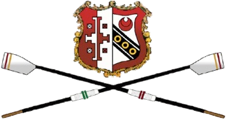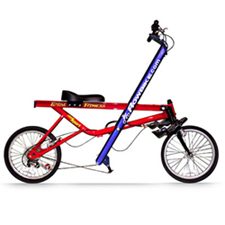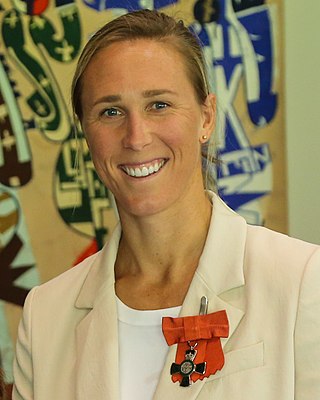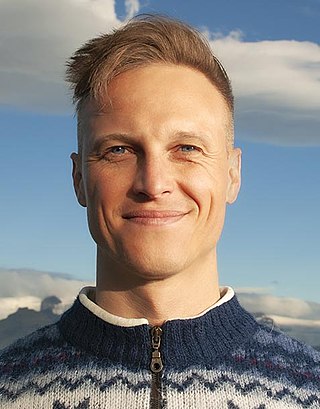Rowing is a form of propulsion of boats and other watercraft.
Contents
Rowing may also refer to:
Rowing is a form of propulsion of boats and other watercraft.
Rowing may also refer to:

An indoor rower, or rowing machine, is a machine used to simulate the action of watercraft rowing for the purpose of exercise or training for rowing. Modern indoor rowers are often known as ergometers because they measure work performed by the rower. Indoor rowing has become established as a sport, drawing a competitive environment from around the world. The term "indoor rower" also refers to a participant in this sport.

Rowing, often called crew in the United States, is the sport of racing boats using oars. It differs from paddling sports in that rowing oars are attached to the boat using rowlocks, while paddles are not connected to the boat. Rowing is divided into two disciplines: sculling and sweep rowing. In sculling, each rower holds two oars, one in each hand, while in sweep rowing each rower holds one oar with both hands. There are several boat classes in which athletes may compete, ranging from single sculls, occupied by one person, to shells with eight rowers and a coxswain, called eights. There are a wide variety of course types and formats of racing, but most elite and championship level racing is conducted on calm water courses 2 kilometres (1.2 mi) long with several lanes marked using buoys.
Cornish is the adjective and demonym associated with Cornwall, the most southwesterly part of the United Kingdom. It may refer to:
A stroke is a medical condition in which poor blood flow to the brain results in cell death.
Fours may refer to several things:

Rowing is the oldest intercollegiate sport in the United States. The first intercollegiate race was a contest between Yale and Harvard in 1852. In the 2018–19 school year, there were 2,340 male and 7,294 female collegiate rowers in Divisions I, II and III, according to the NCAA. The sport has grown since the first NCAA statistics were compiled for the 1981–82 school year, which reflected 2,053 male and 1,187 female collegiate rowers in the three divisions. Some concern has been raised that some recent female numbers are inflated by non-competing novices.

Rowing is the act of propelling a human-powered watercraft using the sweeping motions of oars to displace water and generate reactional propulsion. Rowing is functionally similar to paddling, but rowing requires oars to be mechanically attached to the boat, and the rower drives the oar like a lever, exerting force in the same direction as the boat's travel; while paddles are completely hand-held and have no attachment to the boat, and are driven like a cantilever, exerting force opposite to the intended direction of the boat.

In watercraft, a racing shell is an extremely narrow, and often comparatively long, rowing boat specifically designed for racing or exercise. It is equipped with long oars, outriggers to hold the oarlocks away from the boat, and sliding seats. The boat's long length and semicircular cross-section reduce drag to a minimum. This makes the boat both fast and unstable. It must be balanced by the rowers to avoid tipping. Being able to balance – or "set" – the boat while putting maximum effort into the oars is therefore an essential skill of sport rowing.

Selwyn College Boat Club (SCBC) is the official rowing club for members of Selwyn College, Cambridge, a constituent college of the University of Cambridge. The Selwyn College Boat Club has one of the highest participation rates of novice rowers of any Oxbridge college, and has performed well in the May Bumps and Lent Bumps in recent years. Notable alumni of the Selwyn College Boat Club include Hugh Laurie, Tom Hollander, and Richard Budgett.
Ocean rowing is the sport of rowing across oceans. Some ocean rowing boats can hold as many as fourteen rowers; however, the most common ocean rowboats are designed for singles, doubles, and fours.

Coastal and offshore rowing is a rowing sport performed at sea. In North America, this sport is often called open water rowing.

A rowbike is an example of a rowing cycle, hybrid fitness/transport machine that combines a bicycle, and a rowing machine. "Rowbike" is a trademark of the Rowbike company. The Rowbike was invented by Scott Olson, the creator of Rollerblade inline skates. "Rowling" is a combination of rowing and rolling, and is sometimes used in place of rowing when describing a Rowbike.
A boat is a nautical craft of modest size.
A floor is the bottom surface of a room or vehicle.

Edinburgh University Boat Club (EUBC) is one of the oldest sports clubs of the University of Edinburgh, in the city of Edinburgh, Scotland.

University College Boat Club is the rowing club for all members of University College, Oxford ("Univ"). UCBC is based out of the college's own boathouse on the towpath side of the Isis.

Canoeing – recreational boating activity or paddle sport in which you kneel or sit facing forward in an open or closed-decked canoe, and propel yourself with a single-bladed paddle, under your own power.

Emma Kimberley Twigg is a New Zealand rower. A single sculler, she was the 2014 world champion and won gold in her fourth Olympics in Tokyo in July 2021. Previous Olympic appearances were in 2008, 2012, and 2016. She has retired from rowing twice, first for master-level studies in Europe in 2015 and then after the 2016 Olympics, disappointed at having narrowly missed an Olympic medal for the second time. After two years off the water, she started training again in 2018 and won silver at the 2019 World Rowing Championships. Since her marriage in 2020, she has become an outspoken advocate for LGBT athletes. At the 2020 Summer Olympics, Twigg won gold in the woman's single scull. At the 2024 Summer Olympics, Twigg won Silver in the same event.
Elizabeth "Lizzy" Patrick is an Australian rowing coxswain – a national champion, world champion and a dual Olympian. From 2005 to 2014 she was the prominent coxswain in Australian women's rowing, steering every Australian representative senior women's eight raced at a premier international regatta in that decade.

Fiann Paul is a Polish-Icelandic explorer known for his exploits in ocean rowing.